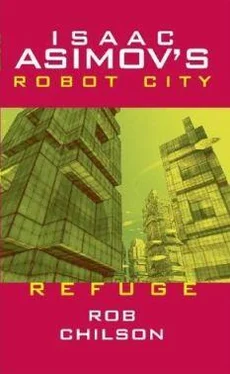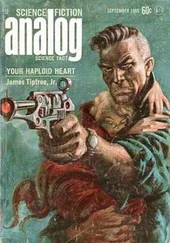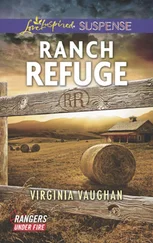Rob Chilson - Refuge
Здесь есть возможность читать онлайн «Rob Chilson - Refuge» весь текст электронной книги совершенно бесплатно (целиком полную версию без сокращений). В некоторых случаях можно слушать аудио, скачать через торрент в формате fb2 и присутствует краткое содержание. Год выпуска: 2004, ISBN: 2004, Издательство: I Books, Жанр: Фантастика и фэнтези, на английском языке. Описание произведения, (предисловие) а так же отзывы посетителей доступны на портале библиотеки ЛибКат.
- Название:Refuge
- Автор:
- Издательство:I Books
- Жанр:
- Год:2004
- ISBN:ISBN: 0-743-48716-8
- Рейтинг книги:5 / 5. Голосов: 1
-
Избранное:Добавить в избранное
- Отзывы:
-
Ваша оценка:
- 100
- 1
- 2
- 3
- 4
- 5
Refuge: краткое содержание, описание и аннотация
Предлагаем к чтению аннотацию, описание, краткое содержание или предисловие (зависит от того, что написал сам автор книги «Refuge»). Если вы не нашли необходимую информацию о книге — напишите в комментариях, мы постараемся отыскать её.
Refuge — читать онлайн бесплатно полную книгу (весь текст) целиком
Ниже представлен текст книги, разбитый по страницам. Система сохранения места последней прочитанной страницы, позволяет с удобством читать онлайн бесплатно книгу «Refuge», без необходимости каждый раз заново искать на чём Вы остановились. Поставьте закладку, и сможете в любой момент перейти на страницу, на которой закончили чтение.
Интервал:
Закладка:
Rob Chilson
Refuge
Cities
by Isaac Asimov
Through eighty percent of the history of Homo sapiens, all human beings were hunters and gatherers. Of necessity, they were wanderers, for to stay in one place would mean gathering all there was of vegetable food and driving away all there was of animal food-and starvation would follow.
The only habitations such wanderers (or “nomads”) could have would have to be either parts of the environment, such as caves, or light and movable artifacts, such as tents.
Agriculture, however, came into being some ten thousand years ago and that introduced a great change.
Farms, unlike human beings and animals, are not mobile. The need to take care of farms and agricultural produce nailed the farmers to the ground. The more they grew dependent upon the harvest to maintain their swollen numbers (too great for most to survive if they had to return to hunting and gathering), the more hopelessly immobile they became. They could not run away, except for brief intervals, from wild animals, and they could not run away at all from nomadic raiders who wished to help themselves to the copious foodstores that they had not worked for.
It followed that farmers had to fight off their enemies; they had no choice. They had to band together and build their houses in a huddle, for in unity there was strength. Forethought or, failing that, bitter experience, caused them to build the huddle of houses on an elevation where there was a natural water supply, and to lay in foodstores and then build a wall about the whole. Thus were built the first cities.
Once farmers learned to protect themselves and their farms, and became reasonably secure, they found they could produce more food than they required for their own needs. Some of the city-dwellers, therefore, could do work of other types and exchange their products for some of the excess food produced by the farmers. The cities became the homes of artisans, merchants, administrators, priests, and so on. Human existence came to transcend the bare search for food, clothing, and shelter. In short, civilization became possible and the very word “civilization” is from the Latin for “citydweller.”
Each city was developed into a political unit, with some sort of ruler, or decision-maker, for this was required if defense of homes and farms was to be made efficient and successful. The necessity of being prepared for battle against nomads led to the development of soldiers and weapons which, during peaceful periods, could be used to police and control the city population itself. Thus, there developed the “city-state.”
As population continued to grow, each city-state tried to extend the food-growing area under its control. Inevitably, neighboring city-states would collide and there would be disputes, which became armed wars.
The tendency would be for one city-state to grow at the expense of others, with the result that an “empire” would be established. Such large units tended to be more effective than smaller ones, for reasons that are easy to explain.
Consider that agriculture requires fresh water, and that the surest supply of that is to be found in a sizable river. For that reason, early farming communities were built along the shores of rivers such as the Nile, the Euphrates, the Indus, and the Hwang-Ho. (The rivers also served as easy avenues for commerce, transportation, and communication.)
Rivers, however, took work. Dikes had to be built along the shores to confine the river and prevent ruin through floods. Irrigation ditches had to be built to bring a controlled supply of water directly to the farms. To dike a river and to maintain a system of irrigation requires cooperation not only of individuals within a given city-state, but among the city-states themselves. If one city-state allowed its own system to deteriorate, the flood that might follow would disastrously affect all other city-states downstream. An empire that controls many city-states can, more effectively, enforce the necessary cooperation and maintain a general prosperity.
An empire, however, usually means the domination of many people by one conquering group, and resentment builds up, and struggles for “liberty” break out. Eventually, under weak rulers, an empire is therefore likely to break up.
World history seems to demonstrate an oscillation between empires (often prosperous, but despotic), and decentralized political units (often producing a high culture, but quarrelsome and militarily weak).
On the whole, though, the tendency has been in the direction not only of large units, but of larger and larger ones, as advancing technology made transportation and communication easier and more efficient, and as overall population increase heightened the perceived value of security and prosperity over liberty and squabbling.
As population grew, cities grew larger and more populous, too. Memphis-Thebes-Nineveh-Babylon-and then, eventually, Rome, which at its peak in the second century A.D. may have been the first city to have a population of one million.
The multi-million city became a feature of the modem world after the Industrial Revolution introduced enormous advances in transportation and communication. The nineteenth century saw cities of four million people and the early twentieth century saw cities of six and seven million people.
All through the last ten thousand years, in other words, the world has become more and more urbanized, and after World War II, the process became a runaway cancer. In the last forty years, the world population has doubled and the population of the developing countries, where the birth rate remained high, has considerably more than doubled. We now have cities, like Mexico City, Sao Paulo, Calcutta, with populations climbing toward the twenty million mark and threatening to go higher still. Such cities are becoming squalid expanses of shantytowns, endlessly polluted, without adequate sanitation, and with the very technological factors that encourage the growth beginning to break down.
Where do we go from here? Anywhere other than decay, breakdown and dissolution?
I tackled the problem of the future city in my novel The Caves of Steel, which first appeared as a three-part serial in Galaxy Science Fiction in 1953. I was influenced in my thinking by the fact that I happen to be a claustrophile. I feel comfortable in crowded and enclosed environments.
Thus, I enjoy living in the center of Manhattan. I move about its crowded canyons with ease and with no sensation of discomfort. I like to work in a room with the blinds pulled down, and at a desk that faces a blank wall, so that I increase my feeling of enclosure.
Naturally, then, I pictured my future New York as a kind of much more extreme version than the present New York. Some people marveled at my imagination.
“How could you think up such a nightmare existence as that in The Caves of Steel?”
To which I would reply in puzzled surprise, “What nightmare existence?”
I had added one novelty, to be sure. I had the entire huge city of the future built underground.
Perhaps that was what made it seem a nightmare existence, but there are advantages to underground life, if you stop to think of it.
First, weather would no longer be important, since it is primarily a phenomenon of the atmosphere. Rain, snow, and fog would not trouble the underground world. Even temperature variations are limited to the open surface and would not exist underground. Whether day or night, summer or winter, temperatures in the underground city would remain equable and nearly constant. In place of spending energy on heating and cooling, you would have to spend energy on ventilation, to be sure, but I think that this would involve a large net saving. Electrified transportation would be required to avoid the pollution of the internal-combustion engine, but then walking (considering the certainty of good weather) would become much more attractive and that, too, would not only save energy, but would promote better health.
Читать дальшеИнтервал:
Закладка:
Похожие книги на «Refuge»
Представляем Вашему вниманию похожие книги на «Refuge» списком для выбора. Мы отобрали схожую по названию и смыслу литературу в надежде предоставить читателям больше вариантов отыскать новые, интересные, ещё непрочитанные произведения.
Обсуждение, отзывы о книге «Refuge» и просто собственные мнения читателей. Оставьте ваши комментарии, напишите, что Вы думаете о произведении, его смысле или главных героях. Укажите что конкретно понравилось, а что нет, и почему Вы так считаете.












